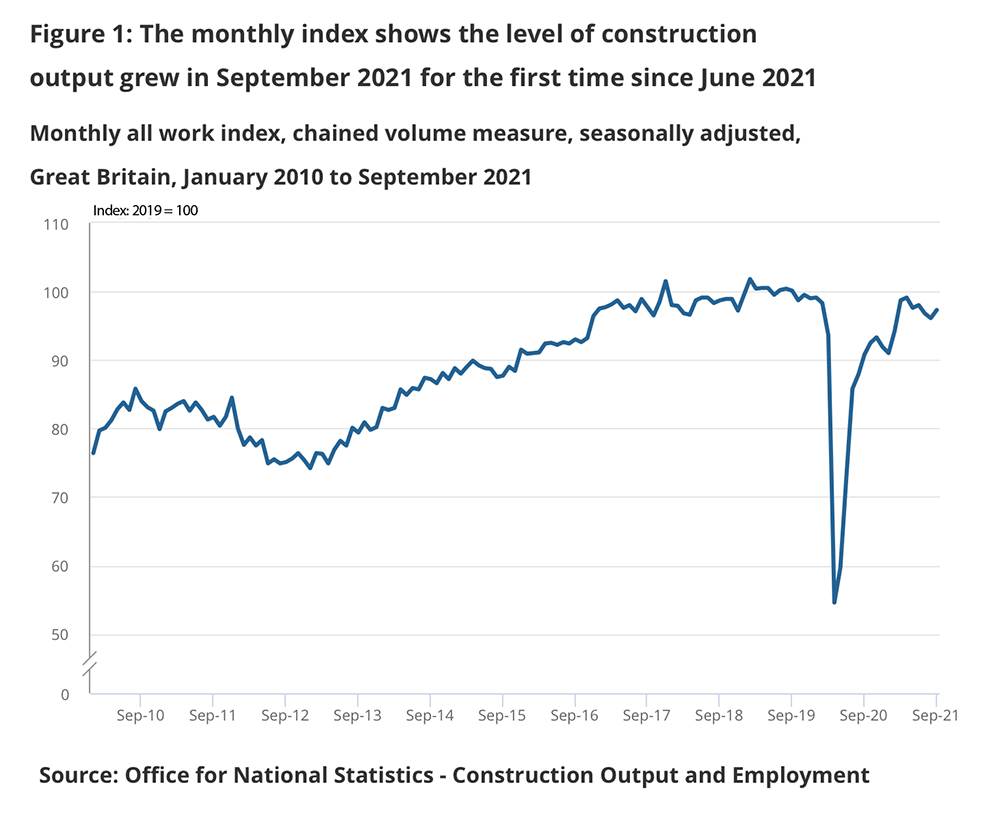
Construction output returned to growth in September, according to official figures, amid positive signs that supply chain issues in the sector are “not insurmountable”.
Output grew by 1.3% in September 2021, compared with the previous month. This was the first monthly increase since June 2021 and the largest since March 2021, when output increased by 4.8%.
However, the level of construction output in September was still 1% (£141m) below the pre-pandemic level of February 2020. New work was 3.5% (£334m) below the February 2020 level, while repair and maintenance work was 3.9% above the February 2020 level.
In contrast to monthly growth, quarterly construction output fell 1.5% in Q3 2021, compared with Q2 2021. Both new work and repair and maintenance decreased, by 0.3% and 3.6% respectively.

Total construction new orders fell 9.2% (£1.2bn) in Q3 2021, compared with Q2 2021.
Meanwhile, the annual rate of construction output price growth was 5.1% in September 2021, making it the strongest annual rate of output price growth since records began in 2014.
Commenting on the figures, Fraser Johns, finance director at Beard, said: “The growth recorded in September is an encouraging sign. Following a concerning trend of declining output, this will hopefully mark a turning point for the construction industry.
“Recovering from the pandemic was never going to be plain sailing the whole way. Despite the positive signs in September, looking at the quarter as a whole, Q3 marked the first quarterly fall in output since Q2 2020.
“Combined with a sustained increase in output through the autumn so far, confirmation of September’s growth will provide a strong foundation for the sector heading into what is likely to still be a challenging end to the year.”
“However, it appears client confidence is gradually returning in the market, as new work increased in September. As more clients are giving the green light to projects, it appears supply chain issues and price rises for raw materials will not be an insurmountable challenge.
“By working closely with suppliers, and with clients, lead in times can be built into projects. At Beard, we are well positioned to handle the disruption caused by the supply issues due to the relationships we’ve built with suppliers. These allow us to have open and honest conversations, which ensure if we do run into supply issues, we can work with the supplier and client to overcome these.”
Mark Robinson, group chief executive at public sector procurement authority Scape, said: “Combined with a sustained increase in output through the autumn so far, confirmation of September’s growth will provide a strong foundation for the sector heading into what is likely to still be a challenging end to the year – characterised by further inflation, and disruption to labour and supplies.
“While these factors will undoubtedly inhibit the chances of an all-out building boom going into 2022, the outcomes of COP26 will go a long way to sustaining growth this winter as the carbon footprint of the built environment comes into sharper focus. The UK has set its stall out as a global leader on net zero, but an extensive programme of retrofitting and regeneration, supported by ‘carbon-first’ procurement, is needed if we are to reduce current and future emissions to the levels needed.”











